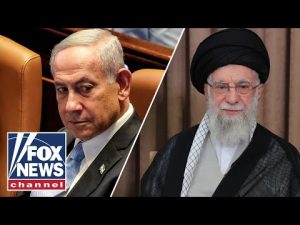In the latest tale of international intrigue, the world’s eyes are glued to the tense situation developing between the United States and Iran. While many probably thought the drama of this saga might dwindle as the years went by, here we are, witnessing yet another chapter in the ever-dynamic U.S.-Iran relationship. President Trump, the star of our geopolitical reality show, has made some intriguing remarks regarding a potential strike on Iran’s Fordo nuclear facility. General Jack Keane brought his military insight to the discussion, adding a dash of gravitas to the situation.
The central issue revolves around the Fordo nuclear site in Iran. Opened like a Pandora’s box, its existence means that Iran retains the potential to develop nuclear weapons. This isn’t just a single site anomaly, though. Iran has crafted a whole web of nuclear sites, each built to withstand attacks like a stubborn house of cards that doesn’t topple with the first gust of wind. Iran’s planners did their homework, ensuring that even if one site falls, others can keep the nuclear ambitions afloat. It seems they are quite determined to maintain this program, much to the chagrin of anyone hoping for voluntary disarmament.
The conversation also touched on the possible effectiveness of the U.S.’s bunker-busting bombs. These explosive little gems are specifically designed to penetrate deep into fortified targets like Fordo. But as anyone familiar with construction can tell you, there’s a difference between hitting concrete and rock. Fordo’s mountainous shield isn’t rolling out the welcome mat for these bombs. Keane hinted that while the bombs are impressive tools, even the burliest of bunker-busters faces a challenge when it meets the rock-hard obstacles literally embedded in the mountains. If strategic strikes don’t work, a Plan B might involve some boots on the ground, though that comes with its own set of risks.
As discussions unfold, Iran seems to be playing coy, with suggestions that they might be open to talks. President Trump, never one to miss a chance for theatrics, seemed ready to entertain the notion, though he expressed the sentiment that they probably missed their chance for a straightforward deal. It’s like the missed opportunity to book a hotel at off-peak rates; sometimes the cost grows, and the consequences must be faced. While the idea of talks sounds nice, the underlying reality suggests Iran remains committed to its status as a nuclear power player.
General Keane, a self-assured voice in the sea of analysis, reiterated that the U.S. wouldn’t be fooled by Iran’s possible attempts to buy time. It’s clear that if Iran doesn’t voluntarily dismantle its program, the U.S. and Israel will continue their vigilant oversight. The Iranian regime’s dedication to its nuclear ambitions remains one of its few power cards. The nuclear dream is primarily about regime preservation, leveraging fear and power over its counterparts in the region.
Finally, the general reiterated that the situation places Iran in a precarious position. Politically and economically weakened, Iran’s nuclear program is central to its survival strategy. Yet, if its grand ambitions were to ever come crumbling down, it might just expose the vulnerabilities the regime has long tried to conceal. The international stage watches closely, with a hush falling over potential allies of Iran, as no one seems eager to jump to its defense. In a world where alliances often shift like desert dunes, Iran may find itself more isolated than it would like to admit. And so, the world continues its anxious watch, popcorn in hand, as these global leaders play their strategic chess game.







